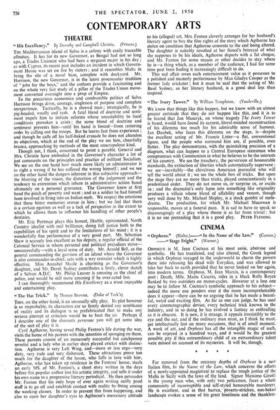CINEMA
"Orpheus." (Rialto.)—" In the Name of the Law." (Curzon.) Stage Fright." (Warner.) ORPHEUS is M. Jean Cocteau at his most eerie, abstruse and symbolic. He has translated, ang also altered, the Greek legend in which Orpheus voyaged to the underworld to charm the powers there into releasing his dead wife Eurydice, and was allowed to take her back to earth provided that he never looked on her again, into modern terms. Orpheus, M. Tean Marais, is a contemporary poet Death, Mlle. Maria Casares, rides in a black Rolls Royce flanked by two outriders on motor-cycles. However at a loss one may be to follow M. Cocteau's symbolic approach to his subject— indeed the more one ponders over it the more incomprehensible does it appear—there can be no arguing that he has made a beauti- ful, weird and exciting film. As far as one can judge, he has used every cinematographic device, eve} x technical trick known to the industry, and in so doing he has evolved a fantasy as enthralling as it is obscure. It is new, it is strange, it appeals irresistibly.to the eye and the ear, and if the ordinary man must, as I think he must, get intellectually lost on many occasions, that is of small moment. A work of art, and Orpheus has all the intangible magic of such, can be enjoyed in a hundred ways, and it would be the greatest possible ,pity if this extraordinary child of an extraordinary talent were missed on account of its mysteries. It will be, though.
* * *


































 Previous page
Previous page